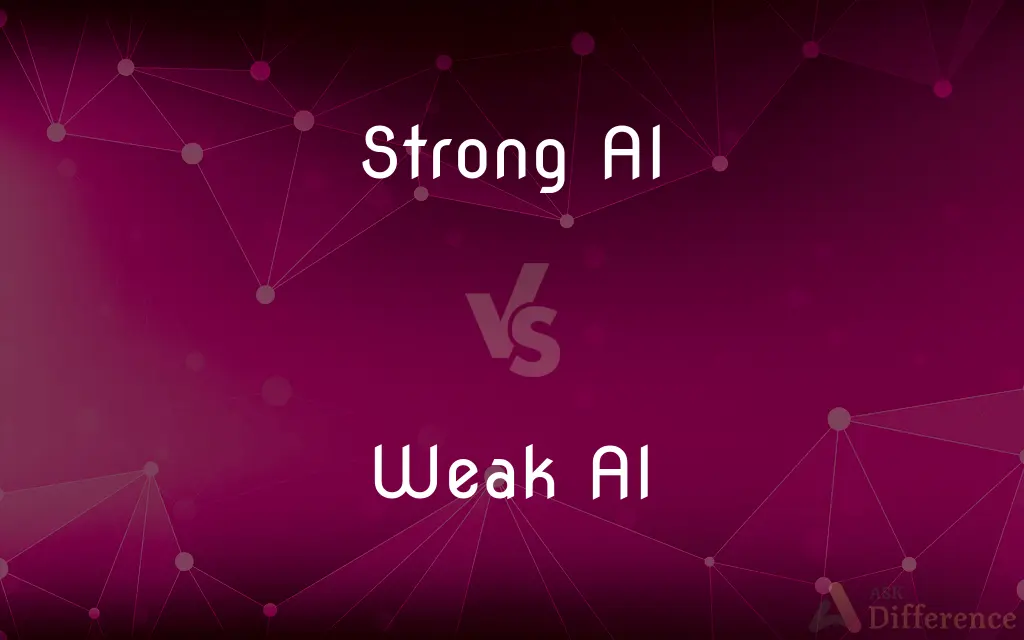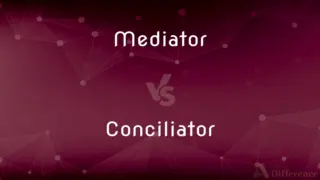Strong AI vs. Weak AI — What's the Difference?
By Fiza Rafique & Maham Liaqat — Published on November 1, 2024
Strong AI aims for genuine cognitive abilities, simulating human reasoning, whereas Weak AI focuses on specific tasks without true understanding.

Difference Between Strong AI and Weak AI
Table of Contents
ADVERTISEMENT
Key Differences
Strong AI, also known as Artificial General Intelligence (AGI), is designed to understand, learn, and apply its intelligence across a wide range of tasks, simulating human cognitive abilities. Weak AI, or Narrow AI, is designed to perform specific tasks without the consciousness or genuine understanding that characterizes Strong AI.
Strong AI's theoretical and aims to perform any intellectual task that a human can do, requiring self-awareness, understanding, and reasoning. Whereas Weak AI operates under a limited pre-defined range or set of instructions and doesn't possess the ability to think or understand beyond its programming.
While Strong AI aims to replicate the human mind's general intelligence, enabling it to learn and solve problems independently across different contexts, Weak AI is built for efficiency in specific tasks. Weak AI includes most of the AI applications we see today, such as virtual assistants, recommendation systems, and voice recognition technologies.
The development of Strong AI involves creating a system that can reason, generalize, and make decisions in an autonomous, human-like manner. This contrasts with Weak AI, which is programmed to be good at specific tasks through rules and data but lacks the ability to apply knowledge outside its domain.
Implementing Strong AI poses significant ethical, philosophical, and technical challenges, as it would require machines to have consciousness and moral reasoning, raising questions about rights and impacts on society. Weak AI, while also raising ethical concerns, primarily focuses on the practical and immediate benefits of automating and enhancing task-specific processes.
ADVERTISEMENT
Comparison Chart
Goal
Achieve human-like cognition and reasoning
Excel in specific tasks without human-like understanding
Intelligence
General, across a wide range of tasks
Narrow, limited to specific tasks
Self-awareness
Aims for self-awareness and understanding
Lacks self-awareness and genuine understanding
Current Status
Theoretical, not yet achieved
Widely used and implemented in various technologies
Example Applications
Hypothetical universal problem-solvers
Virtual assistants, facial recognition, language translation
Compare with Definitions
Strong AI
AI with human-like cognitive abilities.
Strong AI would solve complex problems across different fields without specific programming.
Weak AI
AI designed for specific tasks.
Siri and Alexa are examples of Weak AI designed to assist with information and tasks.
Strong AI
Raises significant ethical questions.
The development of Strong AI prompts debates on robot rights and impacts on humanity.
Weak AI
Lacks the ability to generalize knowledge.
A Weak AI trained in language translation can't apply its skills to unrelated tasks.
Strong AI
Theoretical and aims for genuine understanding.
Strong AI could genuinely understand and produce languages like a fluent speaker.
Weak AI
Widely implemented in technology today.
Recommendation algorithms on streaming services are Weak AI applications.
Strong AI
Not yet achieved, but a goal for future AI.
Researchers in artificial intelligence dream of creating Strong AI.
Weak AI
Raises practical and ethical considerations.
The use of Weak AI in surveillance raises privacy and bias concerns.
Strong AI
Requires self-awareness and reasoning.
Strong AI would recognize its existence and adapt to new challenges independently.
Weak AI
Operates under a limited set of instructions.
Weak AI in a chess program can decide the best move but doesn't understand the game.
Common Curiosities
Is Strong AI a reality today?
No, Strong AI remains a theoretical goal and has not yet been achieved, with current AI technologies classified as Weak AI.
Can Weak AI evolve into Strong AI?
Currently, Weak AI cannot evolve into Strong AI due to fundamental differences in design and goals. Moving from Weak to Strong AI would require significant breakthroughs in AI research.
How does Weak AI impact society?
Weak AI impacts society by automating tasks, enhancing efficiency, and enabling new technological conveniences, though it also raises ethical and employment concerns.
Can Weak AI perform creative tasks?
Weak AI can simulate creativity within narrow bounds but lacks the genuine inspiration and understanding of human creativity.
What distinguishes Strong AI from Weak AI?
Strong AI simulates human cognition across a broad range of tasks with self-awareness, whereas Weak AI excels in specific tasks without true understanding.
Do both types of AI require big data?
While both can benefit from big data, Weak AI primarily relies on it for task-specific training, whereas Strong AI's data needs would be more comprehensive and general.
What role does machine learning play in Strong and Weak AI?
Machine learning is a tool for both, but its role is more pronounced in Weak AI for specific task optimization, while Strong AI would require beyond current machine learning models.
Why is Strong AI considered a future goal?
Strong AI represents the pinnacle of AI research, offering potential solutions to complex global challenges but requires advancements beyond current technological capabilities.
What applications are suited for Strong AI?
Strong AI would be suited for universal problem-solving, including complex decision-making, innovation, and tasks requiring deep understanding.
How does Weak AI benefit businesses?
Weak AI benefits businesses by automating processes, improving decision-making through data analysis, and enhancing customer experiences.
What ethical concerns does Strong AI raise?
Strong AI raises concerns about consciousness, rights, and the potential for misuse, necessitating careful ethical consideration and regulation.
How do Strong and Weak AI differ in learning?
Strong AI would possess the ability to learn autonomously across domains, while Weak AI learns within specific, pre-defined parameters.
Is it possible to convert Weak AI to Strong AI with more data?
Simply adding more data won't convert Weak AI to Strong AI, as the fundamental architecture and capabilities differ significantly.
How does Strong AI theory impact AI research?
Strong AI theory drives research towards creating more general and adaptable AI systems, pushing the boundaries of what AI can achieve.
Share Your Discovery

Previous Comparison
Cucumbers vs. Pickles
Next Comparison
Mediator vs. ConciliatorAuthor Spotlight
Written by
Fiza RafiqueFiza Rafique is a skilled content writer at AskDifference.com, where she meticulously refines and enhances written pieces. Drawing from her vast editorial expertise, Fiza ensures clarity, accuracy, and precision in every article. Passionate about language, she continually seeks to elevate the quality of content for readers worldwide.
Co-written by
Maham Liaqat












































